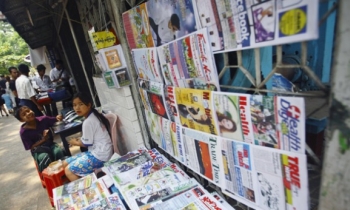Iranian authorities used force to contain demonstrations a week ago in the southwestern province of Khuzestan and banned news coverage of the bloody clashes that took place. Both the national and international media were prevented from covering the incidents. The crackdown has continued this week with several arrests of netizens and media contributors, according to Paris-based press freedom group Reporters sans Frontières (RSF).
The Iranian government hypocritically defends freedom of information about the violence taking place in neighbouring countries such as Bahrain, where blood has been shed to crush anti-government demonstrations, but imposes a complete news blackout on the deadly clashes between members of the Arab minority and security forces in Khuzestan, cutting it off from the rest of the world and denying access to both independent and state media reporters, RSF said.
Calls were issued on the Internet and online social networks for demonstrations on April 15 in the provincial capital of Ahvaz to mark the sixth anniversary of the violent clashes that took place on April 15, 2005 between the security forces and members of the Arab community, who are the majority in province.
Members of the security forces fired live rounds into a spontaneous demonstration by young people on April 14, killing three demonstrators. When the protests continued the next day, they were brutally crushed by Revolutionary Guards in several districts of the city including Haisohari, Coy Alvaieh and Cot Abdollah.
Round-ups of activists had already begun before the calls for demonstrations had been issued, and the arrests are continuing. According to some sources, 97 people are being held in prisons in and around Ahvaz, including Sepidar and Zyton (a secret detention centre controlled by the intelligence ministry).
The detainees include Ali Badri (of the blog Shataljarhi), Ali Torofi (of the blog Karoniat), and poets Hamin Hairi and Shahid Amori, who contribute to various media. Several intellectuals and human rights activists in Iran have condemned the violence.
Shirin Ebadi, the 2003 Nobel peace laureate, wrote to United Nations High Commissioner for Human Rights Navi Pillay on April 18 requesting her intervention. “We have no information about the fate of the prisoners,” she wrote. “The security forces have forced the families of the victims to remain silent.”
The violence of six years ago was triggered by reports of an Iranian government policy of forcibly relocating members of the Arab community to other provinces. A letter circulated on April 15, 2005, which had supposedly been written by a government official, talked of “moving Arabs from this very sensitive area and relocating them in other regions of the country.”
Although the government insisted the letter was forged, its publication prompted uprisings and deadly violence in several of the province’s cities that continued for two days. The Tehran bureau of the Qatari TV station Al-Jazeera, which had been giving the incidents a great deal of coverage, was closed by the Iranian authorities on 18 April 2005 for “inciting unrest.”
RSF has meanwhile learned that Manoucher Tamary, a journalist with the government news agency IRNA, was arrested on April 17 at his home in Sanandaj (in the western province of Kurdistan) by men in plainclothes, who searched his home and seized his computer. It is not known where they took him. Aged 56, Tamary has worked for IRNA since 1994. IRNA reported that he had received a summons from the intelligence ministry a week before his arrest. The news agency’s management has called for his release.









